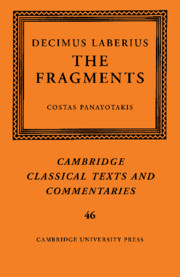INTRODUCTION
Published online by Cambridge University Press: 05 June 2012
Summary
Defining the Roman Mime
Nowadays the word ‘mime’, when used as a verb, indicates the acting of a play or a role, normally without words, by means of gestures and bodily movement. When used as a noun, it signifies the play that is being performed and the performer himself. This form of modern theatre should not be confused with what the Romans understood by the term ‘mime’, despite the features which both the Latin mimus and contemporary mime share. Mime in Roman culture was primarily a type of popular entertainment which covered any kind of theatrical spectacle that did not belong to masked tragic and comic drama, and in which actors and actresses enacted mainly low-life situations and used words in their performances.
The theatrical term mimus existed in the Latin vocabulary from at least the late third century BC, and had four possible meanings, not all of which are attested in sources belonging to the same era. It denoted an actor in a form of drama which was normally simple in structure and farcical in content (CIL 12, 1861; Varro apud Aug. De civ. dei 4.22, 6.1; Rhet. Her. 1.24), the improvised spectacle or the literary play which a mime-actor performed (Varro LL 6.61; Cic. De orat. 2.259), the literary genre to which mime-plays belonged (Cic. Pro Cael. 65), and (metaphorically) a hoax or sham or pretence which was staged at someone's expense (Sen. Contr. 1.5.2).
- Type
- Chapter
- Information
- Decimus LaberiusThe Fragments, pp. 1 - 100Publisher: Cambridge University PressPrint publication year: 2010

